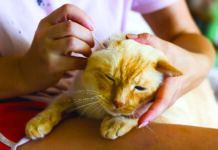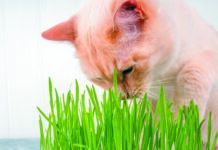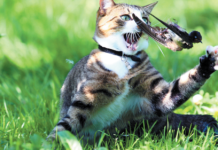Taking the Edge off Separation Anxiety
Cats can and do suffer from separation anxiety. If yours is one of them—anxious when you leave the house and perhaps showing it by eliminating in inappropriate spots or vocalizing loudly enough for neighbors to hear—there are some simple ways to help her cope.
Why You Should Weigh Your Cat’s Food Rather Than Measure It in a Cup
Which one of these methods works well for making sure your cat gets the right amount of food to manage her weight?
A)
Using the bowl you happen to put the food in as her measuring cup.
B) Using an actual measuring cup.
C) Eyeballing the food as you pour it from the bag into the bowl.
D) Measuring it with your hands.
E) All of the above.
F) None of the above.
But How is the Cat’s Breath Bad?
Some people assume that bad breath comes with being a cat, but it does not. Granted, a cat’s breath is probably not going to smell minty fresh even if you regularly brush her teeth. While some toothpastes for felines contains mint, many contain flavors like those of poultry or tuna. Still, your pet’s breath should not smell “off.”
Which Is the Right Kind of Litter Box For Your Cat?
There are two litter box basics that do not change from cat to cat.
Ear odor
Q: I’ve noticed that when I go near my cat’s head as I’m stroking him, there’s an odor coming from his right ear. Is that normal?
Ronan Sloman
Ridgefield, Connecticut
Pregnant women and cats
Q: I just found out I’m pregnant with my first child. I love my cat but have heard that pregnant women shouldn’t be around cats. Is that true?
Starr Fulker
Falmouth, Massachusetts
Danger Zones: The Belly and the Base of the Tail
Your cat rolls over on her back right in front of you. Or she pre-sents you with her behind, the base of her tail specifically. Does she want you to stroke her in those spots? It’s complicated.
Are You the Reason Your Cat is Acting So Aggressively?
Researchers have proposed a number of reasons a cat might act aggressively toward his human housemate. Early weaning, bottle feeding, being a singleton, separation from littermates at too young an age, early life illness or trauma, and poor nutrition have all been shown to increase the risk of aggression in adult cats. Of course, all of those things tend to occur before a cat comes to his forever home. But research indicates that how we interact with our cats once they come to live with us may also lead to aggression.
Download the Full April 2025 Issue PDF
- For the Cat Who Would Like to Chew on Grass but Isn’t Allowed Outside
- Should You Switch from Standard Cat Food to Fresh?
- Has Your Cat’s Vet Spoken to You About the Chill Protocol?
- The Top 10 Cat Poisons
- When Your Cat’s Pupils Become Two Different Sizes
- The Number 2 Issue: When Your Cat Elimi
- Dear Doctor
For the Cat Who Would Like to Chew on Grass but Isn’t Allowed Outside
Cats don’t navigate naturally to vegetables and fruits. They do like to chew on grass and other plants, however. Why is not fully understood. International Cat Care (icatcare.org) posits that grass might help move hairballs and food through the digestive tract—either up or down, since eating grass sometimes results in vomiting. Grass may also provide essential trace nutrients—kind of like a vitamin/mineral supplement.
Refrain from Wetting Your Cat’s Face
While you sometimes (but not often!) may want to bathe your cat, don’t put any water or suds on her face. Cats really do not like that and will have a hard time forgiving you. Just bathe her from the neck down, working towards the tail in the direction of her hair growth. And keep the shampoo dilute—one part shampoo to five parts water, says the ASPCA.
Saving Animals, But Perhaps Not with Your Cat’s Diet
Cats are obligate carnivores, meaning they require meat to survive. Granted, some vegan diets have been formulated for pet cats. But such foods, made with lab-synthesized ingredients, tend to be very expensive. And it’s not always clear how well they are absorbed by a cat’s body. That is, just because a nutrient is delivered in a plant food doesn’t mean it reaches all the tissues in the feline body in appropriate amounts. A lot may be eliminated when a cat voids.















